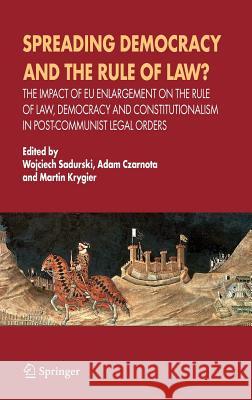spreading Democracy and the Rule of Law?: The Impact of EU Enlargement on the Rule of Law, Democracy and Constitutionalism in Post-Communist Legal Ord » książka
spreading Democracy and the Rule of Law?: The Impact of EU Enlargement on the Rule of Law, Democracy and Constitutionalism in Post-Communist Legal Ord
ISBN-13: 9781402038419 / Angielski / Twarda / 2006 / 390 str.
spreading Democracy and the Rule of Law?: The Impact of EU Enlargement on the Rule of Law, Democracy and Constitutionalism in Post-Communist Legal Ord
ISBN-13: 9781402038419 / Angielski / Twarda / 2006 / 390 str.
(netto: 576,41 VAT: 5%)
Najniższa cena z 30 dni: 578,30
ok. 16-18 dni roboczych.
Darmowa dostawa!
The accession of eight post-communist countries of Central and Eastern Europe (and also of Malta and Cyprus) to the European Union in 2004 has been heralded as perhaps the most important development in the history of European integration so far. While the impact of the enlargement on the constitutional structures and practices of the EU has already generated a rich scholarly literature, the influence of the accession on constitutionalism, democracy, human rights and the rule of law among the new member states has been largely ignored. This book fills this gap, and addresses the question of the consequences of the "external force" of European enlargement upon the understanding and practice of democracy and the rule of law and among both the main legal-political actors and the general public in the new member-states. A number of leading legal scholars, sociologists and political scientists, both from Central and Eastern Europe and from outside, address these issues in a systematic and critical way. Taken together, these essays help answer a fundamental question: does the European Union have the potential of promoting and consolidate democracy and human rights?











